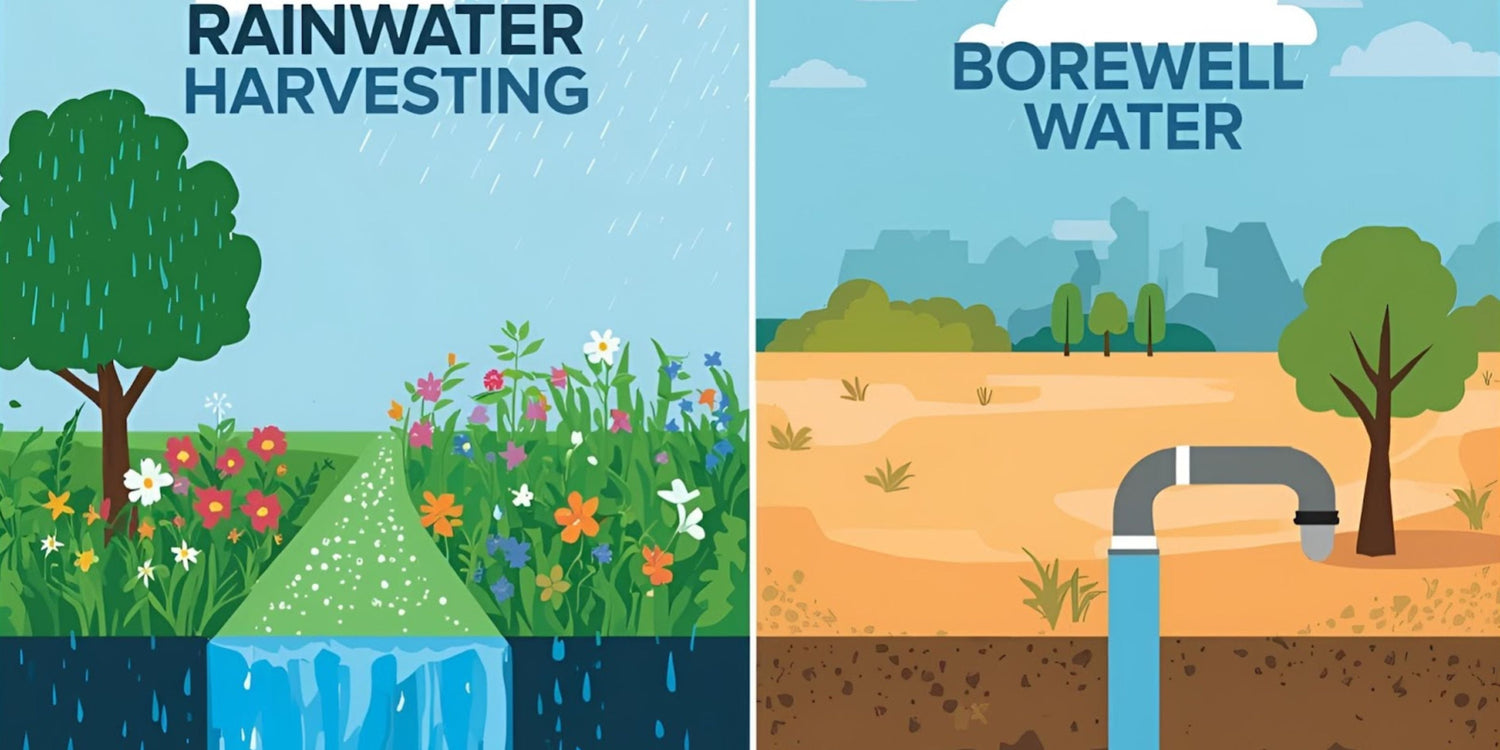When it comes to meeting household and agricultural water needs, one question arises frequently — Rainwater vs. borewell which is better in India? Both are major water sources, but their sustainability, purity, and long-term viability differ greatly. In short, rainwater harvesting provides a cleaner, renewable, and eco-friendly alternative, while borewell water often faces quality and depletion issues. Let’s explore how these two sources compare and which one suits your needs best.
1. Understanding the Basics: What Are These Two Water Sources?
Rainwater harvesting is the process of collecting and storing rain from rooftops or open areas for later use. This stored water can be used for drinking, irrigation, and domestic needs with minimal treatment.
On the other hand, borewell water is drawn from deep underground through drilled wells. It has been a reliable water source in rural and urban India for decades. However, excessive extraction has led to falling groundwater levels and reduced quality.
When comparing rainwater vs borewell, rainwater emerges as a more sustainable option because it replenishes naturally and reduces the stress on underground aquifers.
2. Water Quality: Which One Is Safer to Use?
Rainwater is naturally soft and free from heavy minerals like calcium and magnesium, making it ideal for household and industrial use. With a good rainwater harvesting filter, impurities such as dust, debris, and microorganisms can be efficiently removed before storage.
Borewell water, however, often contains high mineral content, fluoride, or even harmful contaminants, depending on the area. Continuous groundwater extraction without recharge can lead to poor taste, hardness, and health risks.
If you use a Home Water Filtration System, borewell water can be made safe, but the treatment costs are typically higher compared to rainwater filtration.
3. Sustainability: Long-Term Environmental Impact
Water scarcity in many Indian regions makes sustainability a crucial factor. A well-planned rainwater harvesting system promotes groundwater recharge and reduces dependency on municipal supply. It also prevents waterlogging and soil erosion during heavy rains.
In contrast, relying solely on borewell water depletes the underground water table over time. Without proper Borewell recharge methods, this can lead to dry wells, increased drilling depth, and permanent groundwater damage.
Clearly, when we look at the bigger picture, rainwater collection supports long-term ecological balance.
4. Cost Factor: Which Is More Economical?
Installing a rainwater filter system is relatively affordable and requires minimal maintenance once set up. The initial cost depends on tank size, filter type, and plumbing, but it pays off quickly through reduced water bills and independence from unreliable municipal supply.
Borewells, however, require high drilling costs, frequent maintenance, and electricity for pumping water. In many areas, the risk of borewell failure is high due to declining water levels. Over time, maintenance and re-drilling expenses can outweigh the benefits.
Thus, rainwater proves to be the cost-effective and low-maintenance choice in the long run.
5. Water Availability: Reliability Throughout the Year
Rainwater availability depends on seasonal rainfall, but with proper storage and planning, it can meet needs throughout the year. Using a rainwater filter for home systems ensures every drop collected is usable and safe.
Borewell water availability, however, depends on groundwater levels, which can fluctuate drastically between seasons. During dry months, borewells often run dry, leaving communities without a stable water source.
In regions like Tamil Nadu, Telangana, and Maharashtra, many homeowners now combine rainwater harvesting with borewell recharge to ensure a consistent water supply all year round.
6. Environmental Impact: Which Option Is Greener?
Rainwater collection is completely natural and environmentally friendly. It reduces dependency on energy-intensive municipal systems and promotes local water conservation. It’s one of the most effective alternative water sources for homes, schools, and industries.
Borewell extraction, in contrast, can lead to land subsidence, drying of nearby wells, and loss of vegetation due to groundwater depletion. Without rain recharge, the balance between extraction and replenishment is broken.
So, if your goal is sustainability and eco-friendliness, rainwater harvesting wins hands down.
7. Technological Advancements: Modern Solutions for Smart Water Use
Today’s rainwater solutions have become smarter and easier to maintain. Modern systems like the rainy filter automatically separate debris and ensure clean collection with minimal manual effort. Many residential buildings, offices, and factories in India have adopted these systems to ensure a consistent, clean, and sustainable water supply.
Meanwhile, borewells are now being integrated with recharge pits and filtration systems to restore groundwater. Combining both approaches — collecting rainwater and recharging borewells — offers the best balance between sustainability and reliability.
8. The Final Verdict: What’s Best for You?
If you live in an area with consistent rainfall, a rainwater harvesting setup is the ideal choice. It provides fresh, low-cost, and chemical-free water for domestic and agricultural purposes.
However, if your region faces prolonged dry spells, maintaining a borewell as backup along with Borewell recharge methods, can ensure year-round access. The most effective approach is to combine both systems — use rainwater for immediate needs and recharge your borewell for future supply.
Ultimately, when choosing rainwater harvesting vs borewell water, the winner depends on local conditions, but sustainability and water quality clearly favour rainwater.
Key Takeaways:
-
Rainwater harvesting is more sustainable, cost-effective, and environmentally friendly.
-
Borewell water may be convenient but requires more maintenance and risks depletion.
-
Installing a rainwater filter ensures pure, safe, and usable water for daily needs.
-
Combining rainwater harvesting with borewell recharge ensures water security all year.
-
Investing in a modern rainwater filter system reduces bills and environmental impact.
FAQ’s:
1. Can rainwater be used for drinking purposes?
Yes, with proper filtration using a rainwater harvesting filter, rainwater can be safely used for drinking, cooking, and domestic purposes.
2. How does rainwater harvesting help recharge borewells?
Rainwater is directed into recharge pits connected to borewells. This process restores groundwater levels and increases borewell efficiency.
3. Is rainwater better than borewell water for agriculture?
Yes, rainwater is soft and free from harmful salts, making it more suitable for crops compared to mineral-rich borewell water.
4. What maintenance does a rainwater harvesting system need?
Minimal cleaning of filters and tanks once or twice a year is enough to maintain efficiency.
5. How can I make my home water supply sustainable?
Combine a Home Water Filtration System with rainwater collection and borewell recharge to ensure year-round water safety and sustainability.
A Smarter Way to Secure Your Water Future
Choosing the right water source isn’t just about convenience — it’s about responsibility and sustainability. With modern filtration and storage solutions, rainwater can easily become your primary water source while protecting the planet’s future.
To explore advanced rainwater systems and filters that match your needs, visit Rainy Filter.

